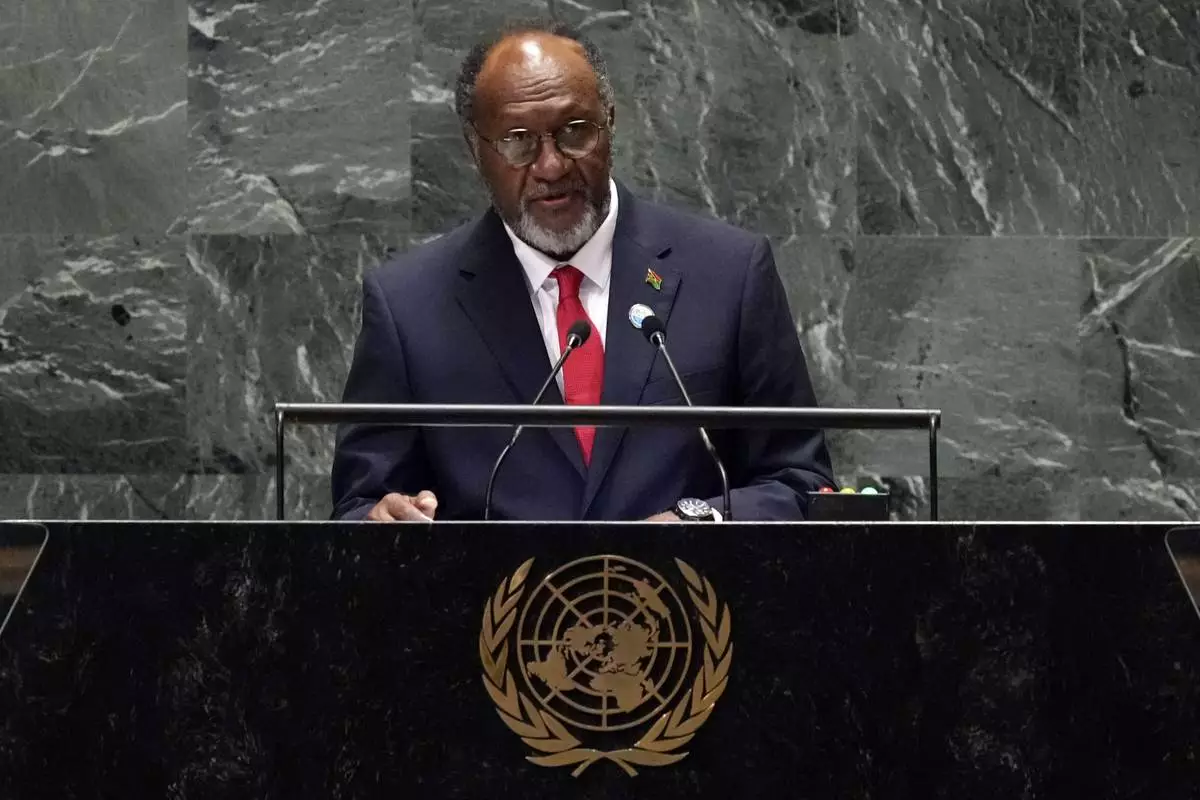No. 22 Illinois still has some big goals to achieve.
The Illini can match their highest win total in 17 years and move within one of the school record if they beat struggling Northwestern at Wrigley Field to close out the regular season on Saturday.
“There's still a lot out there, a lot of things to be determined not only by us but the people around us,” coach Bret Bielema said. “I'm super excited to play at Wrigley. I grew up a Cubs fan, sang there a couple of times.”
The Illini (8-3, 5-3 Big Ten) squeezed out a 38-31 win at Rutgers last week when Luke Altmyer connected with Pat Bryant for a catch-and-run, 40-yard touchdown pass with 4 seconds remaining. Illinois is now in line for its highest win total since the 2007 Rose Bowl team finished 9-4. The school record is 10, most recently during the 2001 Sugar Bowl season.
Northwestern (4-7, 2-6) has lost four of five, with the win coming against last-place Purdue. The Wildcats have been outscored a combined 81-13 in the two games since beating the Boilermakers. They were blown out 50-6 at Michigan last week after getting thumped by No. 2 Ohio State in the first game this season at Wrigley Field.
Northwestern played its first five home games at a temporary lakefront stadium. A new Ryan Field being built on the site of the old one is scheduled to open in 2026.
Northwestern is 0-4 at Wrigley Field since college football returned to “The Friendly Confines” in 2010 after more than a seven-decade absence.
The Wildcats have been outscored in those games by a combined 121-55, starting with a 48-27 loss to Illinois in 2010. That one is most remembered because the back of the end zone in right field was too close to the wall, so offenses could only go in the other direction. A massive renovation eliminated that issue.
Illinois will be playing at Wrigley for the third time. The 1923 national championship team — led by Red Grange — beat Northwestern 29-0.
Bryant was Big Ten Co-Offensive Player of the Week coming off a huge game in which he set a career high with 197 yards on just seven catches. The winning touchdown was his third in the final minute or overtime this season — tops in the nation. It also gave him 2,025 yards in four seasons at Illinois.
Northwestern coach David Braun praised quarterback Jack Lausch and insisted he is “very confident” the decision to take over as the starter after Mike Wright struggled through the first two games. He would not say if he'll look to add a QB in the transfer portal.
Lausch has more interceptions (six) than touchdowns (five). He got picked off twice against Michigan and was sacked five times while completing 10 of 21 passes for 106 yards.
“It can be really easy to point out issues at the quarterback position when our offense is not operating at the level that you want it to,” Braun said. “That's what makes that position so great. You get to touch the ball on every play. There's a lot that comes with holding that position.”
The Rutgers game was not the first time Illinois rallied in the fourth quarter to win. The Illini also did it against Kansas, at Nebraska and against Purdue. They are 4-1 in one-score games.
Northwestern kept things close in the early going against Michigan.
The Wildcats' Luke Akers kicked field goals on consecutive drives in the second quarter. Things got out of hand after that, with Michigan scoring 40 unanswered points the rest of the way. Northwestern was held to 10 yards rushing in the game, including 33 yards lost on six sacks.
The story has been updated to delete an incorrect reference to the Rutgers game going to overtime.
AP college football: Get poll alerts and updates on the AP Top 25 throughout the season. Sign up here. AP college football: https://apnews.com/hub/ap-top-25-college-football-poll and https://apnews.com/hub/college-football

Illinois wide receiver Pat Bryant (13) scores a 40-yard touchdown after making a catch as teammate Alexander Capka-Jones (15) celebrates in the final seconds of an NCAA college football game against Rutgers, Saturday, Nov. 23, 2024, in Piscataway, N.J. Illinois defeated Rutgers 38-31. (AP Photo/Rich Schultz)
THE HAGUE (AP) — The top United Nations court will take up the largest case in its history on Monday, when it opens two weeks of hearings into what countries worldwide are legally required to do to combat climate change and help vulnerable nations fight its devastating impact.
After years of lobbying by island nations who fear they could simply disappear under rising sea waters, the U.N. General Assembly asked the International Court of Justice last year for an opinion on “the obligations of States in respect of climate change.”
“We want the court to confirm that the conduct that has wrecked the climate is unlawful,” Margaretha Wewerinke-Singh, who is leading the legal team for the Pacific island nation of Vanuatu, told The Associated Press.
In the decade up to 2023, sea levels have risen by a global average of around 4.3 centimeters (1.7 inches), with parts of the Pacific rising higher still. The world has also warmed 1.3 degrees Celsius (2.3 Fahrenheit) since pre-industrial times because of the burning of fossil fuels.
Vanuatu is one of a group of small states pushing for international legal intervention in the climate crisis.
“We live on the front lines of climate change impact. We are witnesses to the destruction of our lands, our livelihoods, our culture and our human rights,” Vanuatu’s climate change envoy Ralph Regenvanu told reporters ahead of the hearing.
Any decision by the court would be non-binding advice and unable to directly force wealthy nations into action to help struggling countries. Yet it would be more than just a powerful symbol since it could serve as the basis for other legal actions, including domestic lawsuits.
On Sunday, ahead of the hearing, advocacy groups will bring together environmental organizations from around the world. Pacific Islands Students Fighting Climate Change — who first developed the idea of requesting an advisory opinion — together with World Youth for Climate Justice plan an afternoon of speeches, music and discussions.
From Monday, the Hague-based court will hear from 99 countries and more than a dozen intergovernmental organizations over two weeks. It’s the largest lineup in the institution’s nearly 80-year history.
Last month at the United Nations’ annual climate meeting, countries cobbled together an agreement on how rich countries can support poor countries in the face of climate disasters. Wealthy countries have agreed to pool together at least $300 billion a year by 2035 but the total is short of the $1.3 trillion that experts, and threatened nations, said is needed.
“For our generation and for the Pacific Islands, the climate crisis is an existential threat. It is a matter of survival, and the world’s biggest economies are not taking this crisis seriously. We need the ICJ to protect the rights of people at the front lines,” Vishal Prasad, of Pacific Islands Students Fighting Climate Change, told reporters in a briefing.
Fifteen judges from around the world will seek to answer two questions: What are countries obliged to do under international law to protect the climate and environment from human-caused greenhouse gas emissions? And what are the legal consequences for governments where their acts, or lack of action, have significantly harmed the climate and environment?
The second question makes particular reference to “small island developing States” likely to be hardest hit by climate change and to “members of “the present and future generations affected by the adverse effects of climate change.”
The judges were even briefed on the science behind rising global temperatures by the U.N.’s climate change body, the Intergovernmental Panel on Climate Change, ahead of the hearings.
The case at the ICJ follows a number of rulings around the world ordering governments to do more to reduce greenhouse gas emissions.
In May, a U.N. tribunal on maritime law said that carbon emissions qualify as marine pollution and countries must take steps to adapt to and mitigate their adverse effects.
That ruling came a month after Europe’s highest human rights court said that countries must better protect their people from the consequences of climate change, in a landmark judgment that could have implications across the continent.
The ICJ’s host country of The Netherlands made history when a court ruled in 2015 that protection from the potentially devastating effects of climate change is a human right and that the government has a duty to protect its citizens. The judgment was upheld in 2019 by the Dutch Supreme Court.

FILE -Vanuatu Prime Minister Charlot Salwai Tabimasmas addresses the 79th session of the United Nations General Assembly, Friday, Sept. 27, 2024. (AP Photo/Richard Drew), File)

FILE - The Peace Palace housing the World Court, or International Court of Justice, is reflected in a monument in The Hague, Netherlands, Wednesday, May 1, 2024. (AP Photo/Peter Dejong, File)












